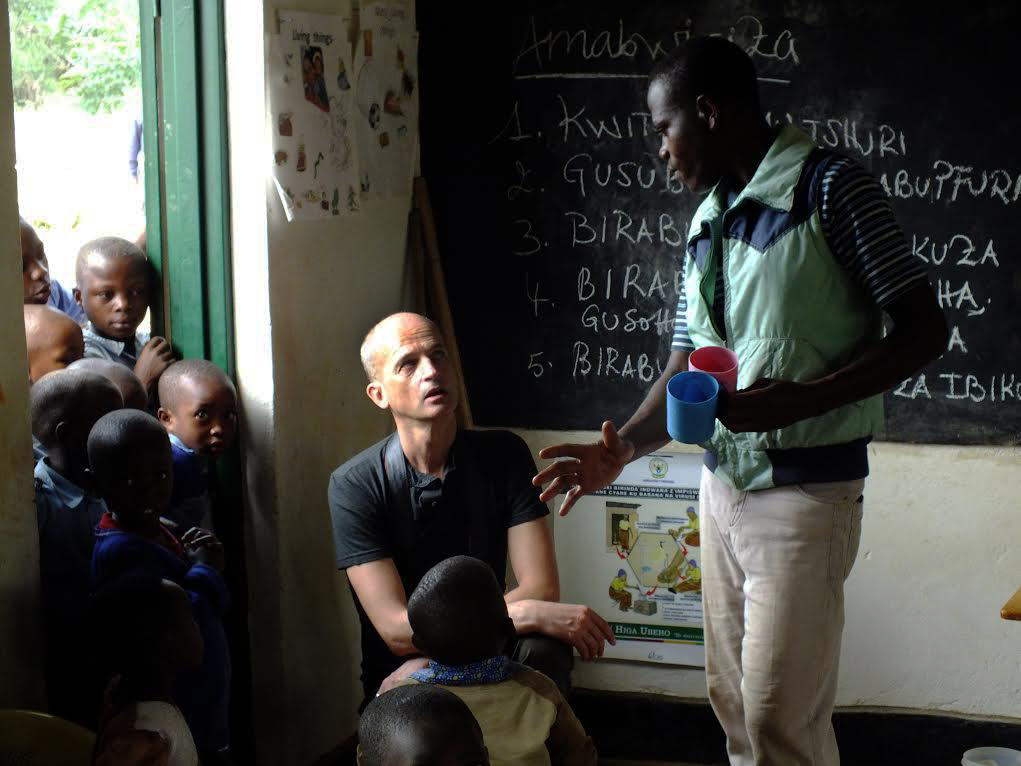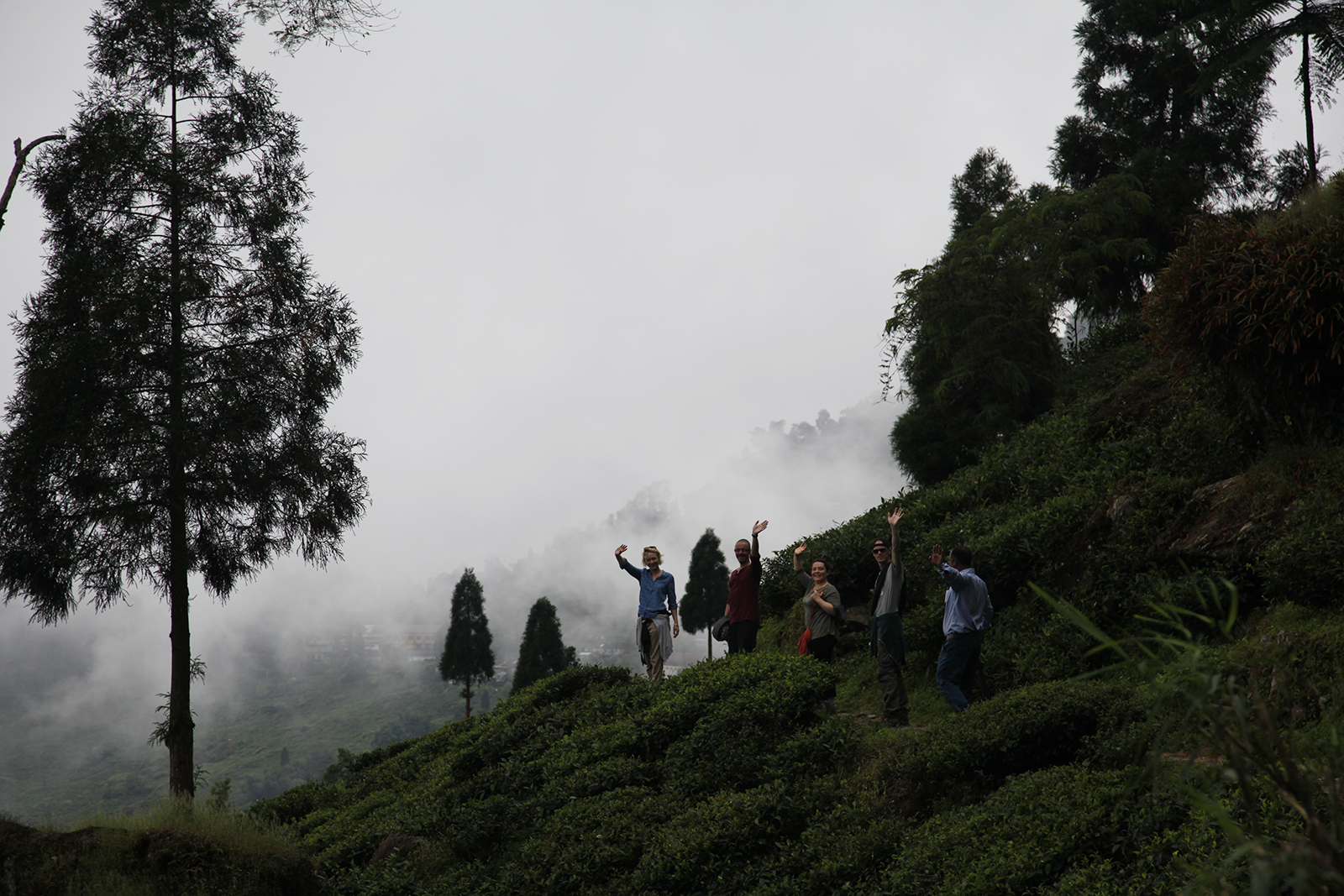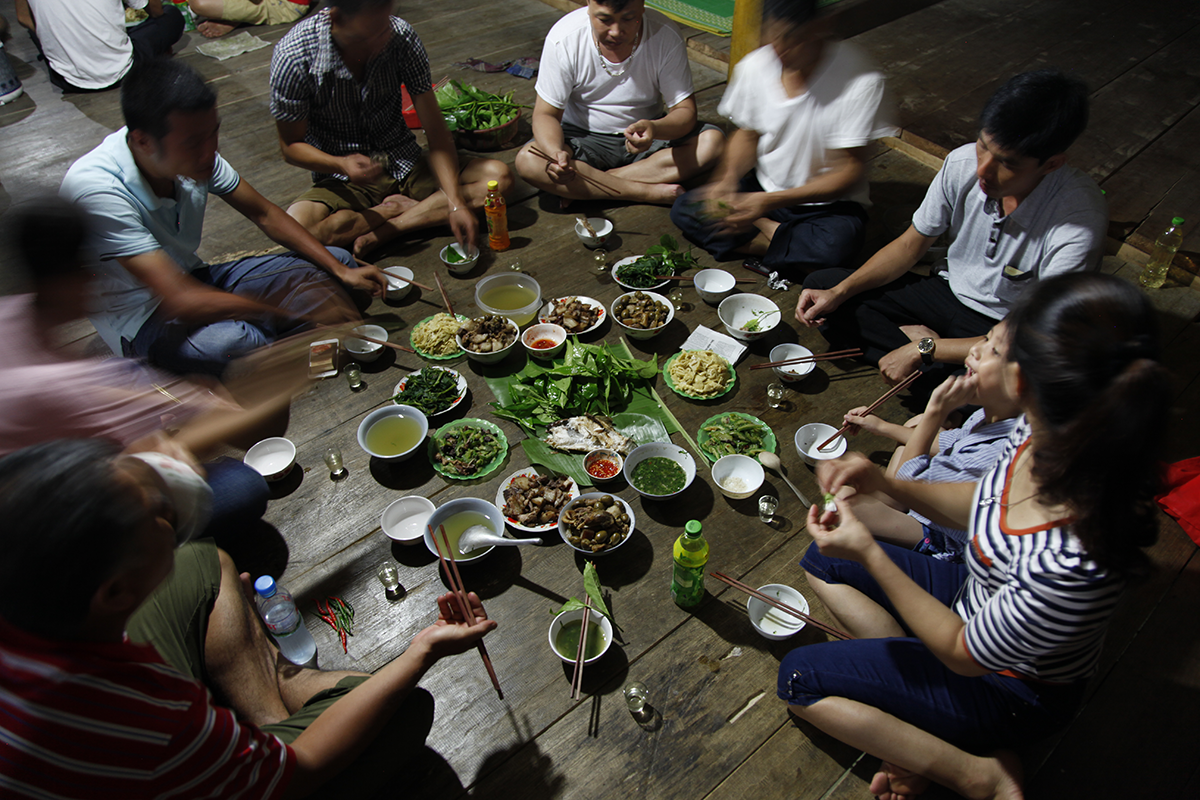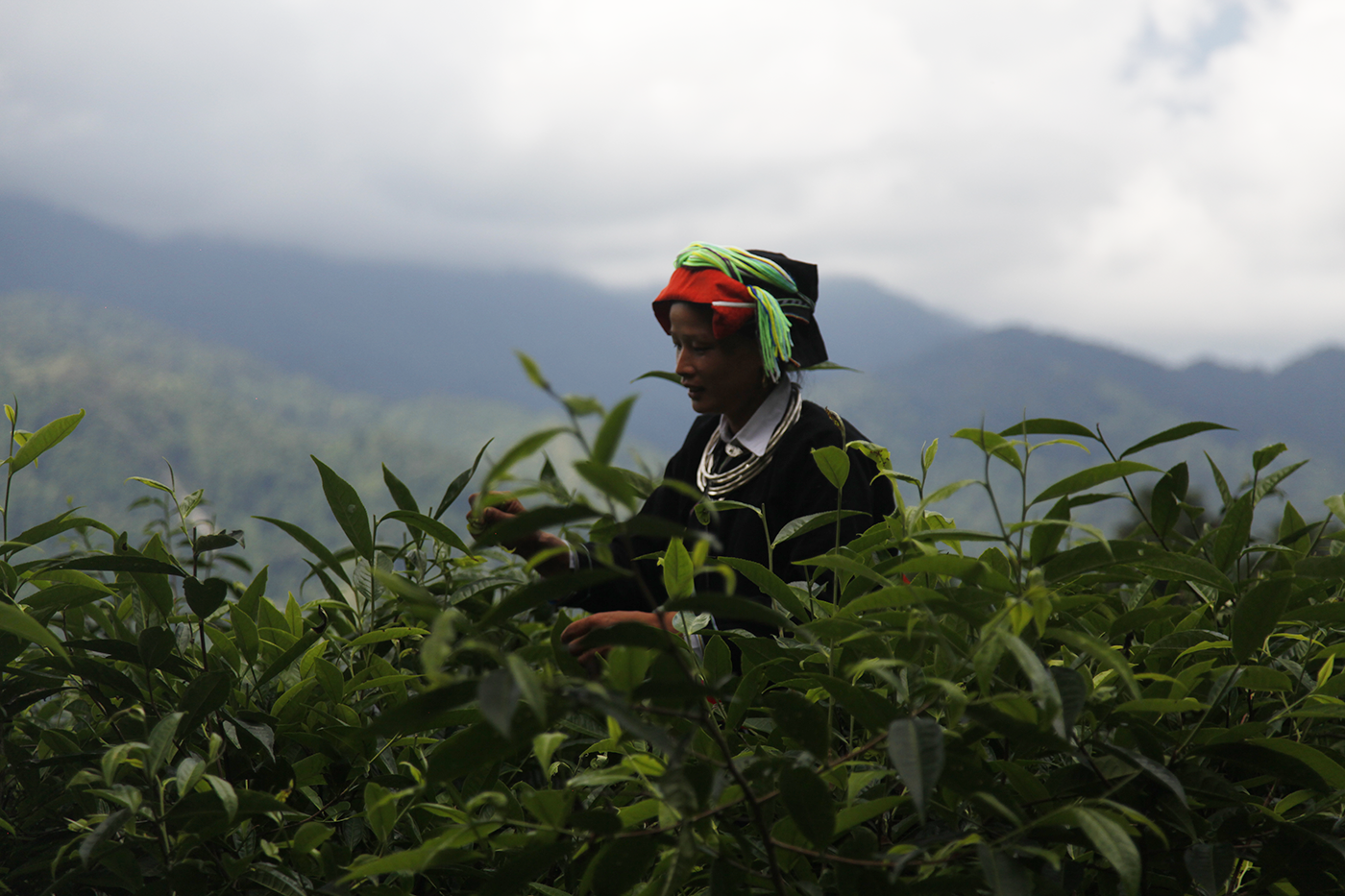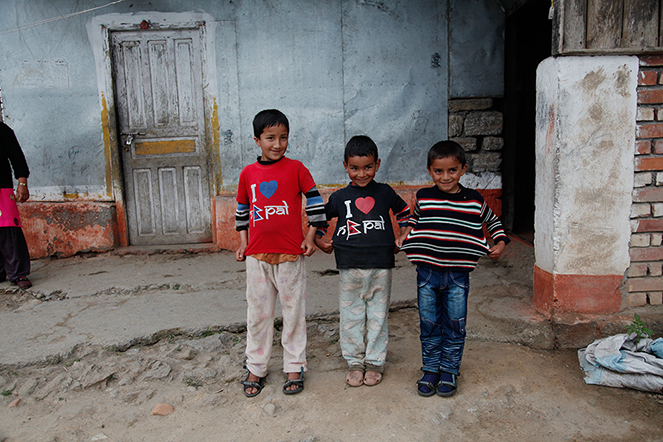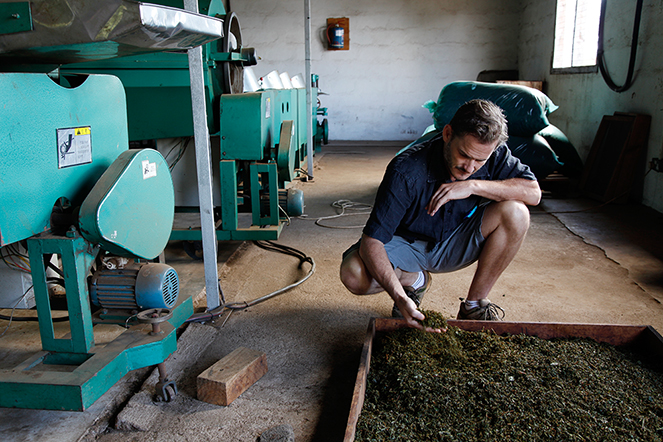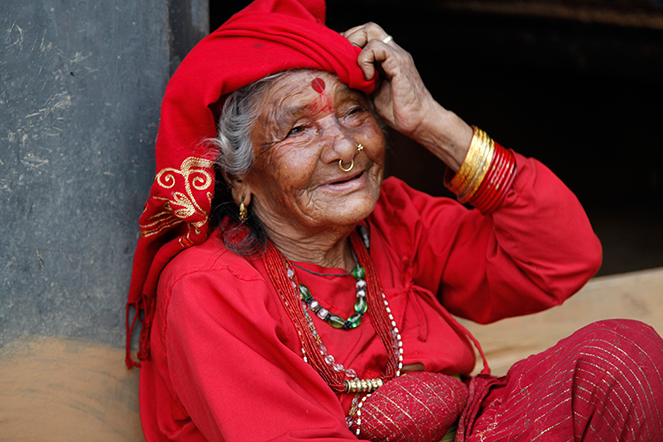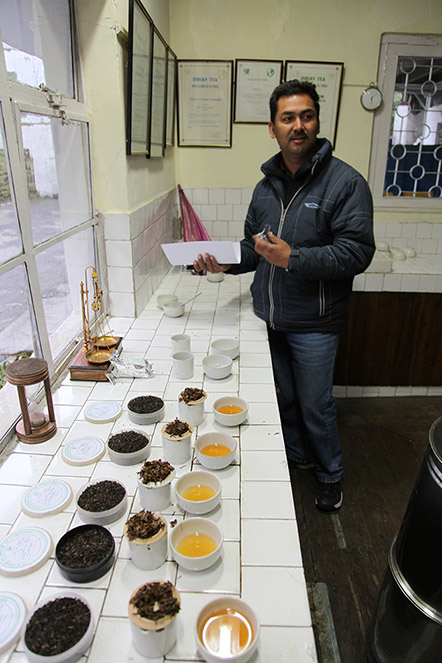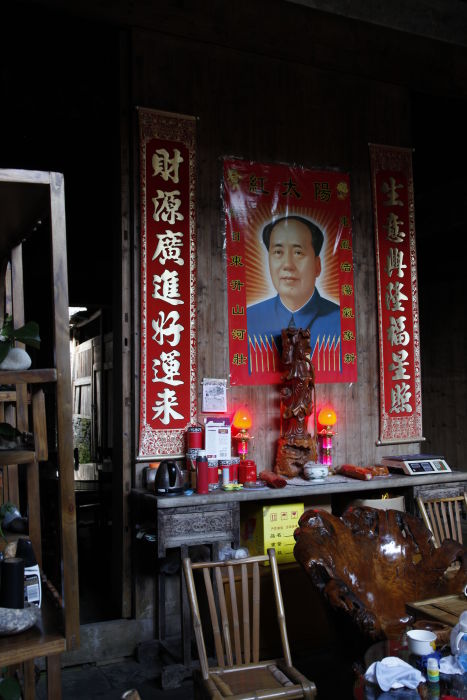A tea plantation, a farm that produces tea, is a whole world in itself. Wherever tea is grown, wherever it’s processed, there’s both an agricultural aspect and a human aspect. Tea is where these two paths meet: plants and people. So when I meet tea producers I naturally take an interest in every part of life on the farm: the quality of the tea, of course, as well as the plants and soil, and how they’re respected. Also the quality of the environment, forests and rivers; the quality of housing, and the treatment workers receive if they’re injured; the quality of all preventive measures put in place and, most of all, the quality of education. Visiting schools is part of my job, and I really enjoy talking with the students and teachers alike. I wouldn’t miss these moments, or rush them, for anything in the world.
Tea people
Sharing tea
I’ve just got back from Darjeeling. Every year I invite store managers to visit the plantations with me. I remember the beginnings of Palais des Thés. I spent the first three years of this great adventure in the shop, behind the counter, serving customers. At the time I’d never seen a tea plant. Then I packed my bag and set off to explore the tea mountains of China, Japan and India, followed by other countries. This experienced completely changed me and the connection I had with tea. Tea became my passion. This connection became strong, rich and powerful. My life changed.
That’s why I want our store managers to have the same opportunity as I did, to discover tea in its natural surroundings, to meet the people who work with tea, from the pickers to the farmers and those who manufacture it. The opportunity to understand the climate, the soil, the varieties and the production methods. Tea is a whole world in itself, just like wine. You only need to alter one aspect slightly – a change in altitude or orientation, a less steep slope, a hybrid cultivar, a downpour during processing, or whatever – to give tea a different flavour. Nothing replaces hands-on experience. These store managers return with joyful hearts and wonderment in their eyes. Now it’s their turn to dream of those misty mountains, of the people they met, the smiles they exchanged. And above all, to share their dreams with their staff, their customers and the people around them. You have to experience tea to understand it.
Following tradition
After a tiring day of walking for more than six hours to reach the old tea plants and then returning to the village, I needed to recover. The food in this region of northern Vietnam is delicious. With the Dao people who were hosting me, I followed tradition: throughout the meal, I toasted many times with the people who raised their glass to me. Each time I had to down my drink in one, and shake hands with them. Between slugs of the local rice alcohol, I took time to appreciate every tasty dish. The meals were prepared in the room where we sat to eat, on the ground. As soon as the meal was over we lay down on mats, in the same room, with nothing to separate us apart from a mosquito net between each person, not even from the jungle outside, with all its noises that interrupted my sleep. I could hear noises from the other mats: a mother breastfeeding her baby, someone else snoring loudly, another person coughing, and other various sighs and mutterings. By the time the cock crowed I’d been awake for some time, and I went outside to walk, to watch the day break from the edge of a rice field above the village. When I returned for breakfast and sat down, I was surprised to see the master of the house offer me more rice alcohol, and enthusiastically raise his glass in my direction. I declined. I couldn’t believe it, I was dreaming of tea, but in vain; my host was serious. He grew gloomy at my protestations, and would have been offended if I’d continued. Travelling is all about adopting the traditions of the people who are kind enough to welcome us, so I swallowed my drink. Later, he offered me a well-deserved tea, a tea I’d rarely longed for so much.
A mosaic of cultures
In regions where tea is picked from plants growing in the wild, whether that’s in southern Yunnan (China), northern Laos or here, in Vietnam, the villages are mainly populated by ethnic minorities. There is a great diversity of these minorities. Each one has its own customs, and sometimes its own language. When you walk through the mountains in these regions, you get to experience this mosaic of cultures. This woman, who is busy picking tea leaves from the top of a tree, belongs to the Dao community. (To be continued.)
Darjeelings in demand
It’s not an easy job, growing tea. In Darjeeling, after a winter that was too dry, it did eventually rain, but a few days ago an unusually violent hailstorm hit the region and caused considerable damage on plantations in the north of the district. Luckily, between the rain and hail, a few very good batches were produced, and I’m pleased to say that we will shortly be receiving some remarkable teas from Risheehat, Puttabong, Singbulli, Thurbo Moonlight, North Tukvar, DelmasBari and Turzum.
Speaking of Turzum, here’s a photo I took in March of Anil Jha, one of the three most respected planters in Darjeeling. Here, he is concentrating on the smell of the damp leaves that are in the lid of the tasting set.
Loving one’s country
At a time when we are seeing our French flag flying everywhere, I have rediscovered this wonderful photo. Last May, when their country had just been hit by a serious earthquake, these children proudly showed off their “I love Nepal” slogans, with big heart-warming smiles on their faces. These children have every reason to love their beautiful country.
Alex, pioneer of “grand cru” teas from Malawi
The existence of very good teas in Malawi is down to Alex. He is the only one to produce them. All the plantations in this country produce tea industrially, and harvest it with shears, but this was not right for Alex. He loves tea. He was born in Malawi, grew up on his grandfather’s plantation, and tea has been his whole life. So he researches, he documents the methods of making dark teas, green teas, semi-oxidised teas, white teas. He seeks out particular tools needed to produce them, from China or Taiwan. He makes teas in his own way, in his own style, with his terroir, his cultivars.
From Alex, I have chosen his Satemwa Dark, his Zomba Green and his Small Holders Black tea – produced through his association formed with small producers, and currently the best black tea from Africa. I recommend it wholeheartedly.
An encounter off the beaten track
This woman is 95. She lives on an isolated farm, with her husband. They live alone, on the mountainside, far from any other houses, with just a few chickens and a little land to cultivate. A tiny path leads to their house. It is so narrow you must place one foot in front of the other. I visited them last week, while walking in the mountains in eastern Nepal. I was with Andrew, the planter from Guranse who shares my love of long walks. She made us tea while we talked with her husband. She brought us the tea in a metal goblet and threw a handful of cereal into a small, separate bowl. We poured the milky tea, which was quite peppery, over the cereal, and ate. We drank the remaining tea. We talked for a long time with her and her husband, on their doorstep, beneath a beehive. They talked non-stop. She understood my mediocre Hindi but spoke only in Nepali. Andrew translated for me. When I managed to get a word in, I asked her questions. What was her secret for a long life? Eating healthy food; fresh, home-grown produce. And was not love also the secret of their longevity? She laughed and exchanged a tender, incredibly touching, look with her husband. They married when she was 11. He was 15. They love each other. They have been together more than 80 years. When it was time for us to leave, they took our hands, and they blessed us by placing their hands on our foreheads. And they asked us if, later, when they are no longer there, we could once, just once, think of them.
Tea is also about people and feelings
Behind each “grand cru”, each tea, there is work, there are people. My work, as I see it, is not limited to tracking down the best teas in the world, it also involves getting to know the people who produce it. Drinking tea with them. Listening to them talk about their product. So when I’m in a Palais des Thés store and I look at that impressive wall of canisters, it’s not the names of the teas on the labels I see, but faces, like that of Vikas Gajmer, manager of Castleton (Darjeeling).
Gifts beneath a portrait in China
When I’m invited into farmers’ homes in China, I sometimes find myself confronted by Chairman Mao. I don’t know if he’s worshipped or idolised, but in any case, the offerings and lights are there, beneath his portrait that presides over the main living room. A divine Mao.

